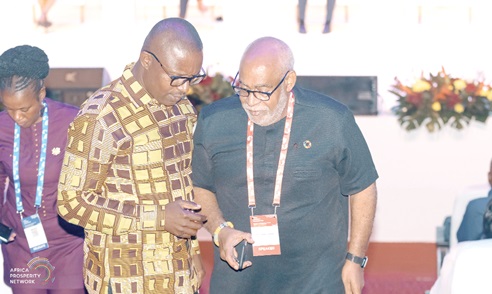
Africa must unite, innovate to achieve sustainable energy — Minister
The Minister of Energy, John Abdulai Jinapor, has stated that achieving reliable and affordable energy, as well as sustainable energy in Africa, demands unity, innovation and commitment.
He said by responsibly leveraging its natural resources, prioritising renewable energy and investing in its people, Africa could forge a prosperous, inclusive and sustainable energy future.
Mr Jinapor, who was speaking on the topic: “Delivering affordable, accessible and sustainable energy solutions for Africa” on the second day of the Africa Prosperity Dialogues (APD) in Accra yesterday, said the energy future of the African continent could not be shaped by individual countries by working in isolation.
Describing energy as the lifeblood of Africa's single mountains, the Energy Minister called for collaboration, saying such an intent would ultimately drive industrialisation support, uncover the objectives of the African Continental Free Trade Area (AfCFTA) and significantly enhance the quality of life for millions of Africans.
Approaches
These approaches, Mr Jinapor explained, would not only address immediate financing needs but would also build investor confidence and lay the foundation for a vibrant and self-reliable energy ecosystem.
He further stressed the commitment of the government to embark on the progressive path towards ensuring that renewable and sustainable energy were achieved, not just for Ghana, but for the country to serve as a reliable hub for the entire West Africa.
Renewable energy
On renewable energy, Mr Jinapor said the government would prioritise it as part of the energy transition of the country by focusing on solar, wind, mini-hydro and other renewable sources for the continent, and Ghana in particular, to meet its energy needs and requirements.
To achieve that, the minister said: “We intend to deepen and ensure that we achieve total gas to power”.
Already, he said about 80 per cent of the thermal fuel release had been achieved with natural gas, which, he said, when pursued would achieve 100 per cent gas to power in energy consumption.
“We also want to accelerate renewable energy consumption, both on and off-grid, as well as promote energy efficiency, to reduce wastage and ensure that we achieve overall benefit from the energy that we produce and consume.
“Ghana stands ready to lead this, working in collaboration with partners across the continent, and beyond, to unlock the full potential of the energy sector of Africa,” Mr Jinapor said, adding that “together, we can power the progress of Africa and secure a brighter and more sustainable future for generations to come”.
Human resource
He said a successful energy transition hinged on the availability of skilled labour and expertise, and for that reason, the country was prioritising the development of its human resources through targeted training, and to provide the needed education.
That, he explained, would aid the country to withstand the headwinds and go through the energy transition without serious challenges and hitches, pointing out that Ghana believed in leveraging regional partnerships to tackle the fragmented energy landscape of Africa.
Mr Jinapor said through the West African Power Pool, the continent was determined to strengthen cross-border energy trade and infrastructure through the interconnectivity of grids.
So far, he explained, Ghana supplied energy to Benin, Burkina Faso, Cote d’Ivoire and Togo, a step which, he said, supported the rationale behind the West African Power Pool, which would serve as an avenue and a common platform to exchange and sell electricity and power among African countries.
He, however, acknowledged that access to capital remained one of the most significant obstacles to energy development across Africa.
To address the challenge, he said Ghana was feeling forced to prioritise self-funded private sector involvement and would tap into other green bonds and regional trade initiatives to address the challenge.
